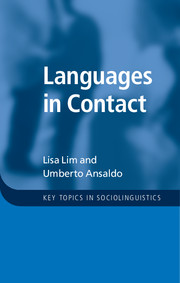Book contents
- Frontmatter
- Contents
- List of figures
- List of tables
- Preface
- Acknowledgements
- List of abbreviations
- 1 Perspectives on contact
- 2 Contact and code choice
- 3 Contact and creole formation
- 4 Contact and language evolution
- 5 Contact and ecology
- 6 Contact and shift
- 7 Contact and globalisation
- 8 Reflections and future directions
- References
- Index
1 - Perspectives on contact
Published online by Cambridge University Press: 05 November 2015
- Frontmatter
- Contents
- List of figures
- List of tables
- Preface
- Acknowledgements
- List of abbreviations
- 1 Perspectives on contact
- 2 Contact and code choice
- 3 Contact and creole formation
- 4 Contact and language evolution
- 5 Contact and ecology
- 6 Contact and shift
- 7 Contact and globalisation
- 8 Reflections and future directions
- References
- Index
Summary
INTRODUCTION
On 26 December 2004, an undersea earthquake occurred in the Indian Ocean with an epicentre off the west coast of Sumatra, Indonesia. At 9.0 on the Richter scale, it triggered a series of tsunamis along the coasts of most landmasses bordering the Indian Ocean, which inundated coastal communities with waves up to thirty metres, and killed more than 230,000 people in fourteen countries. Close to the epicentre, most of the Andaman and Nicobar Islands – an archipelago of 572 islands in the Bay of Bengal between Myanmar and Indonesia – were devastated. As it was feared that North Sentinel Island, one of the Andaman Islands, would also have been swamped, an Indian Coast Guard rescue helicopter was sent to check on casualties. A single naked bowman emerged from the forest and fired arrows to drive the helicopter away. This made the news, not only for the fact that the Sentinelese had survived the tsunami. What piqued the world's interest then – and continues to do so – was the existence of a ‘Stone Age’ tribe (as it came to be dubbed), numbering about 250, thought to be directly descended from the first human populations to emerge from Africa. The tribespeople were estimated to have lived on the Andaman Islands for up to 60,000 years, but with very little contact with the outside world for thousands of years. That their language is so different even from other Andaman Islanders suggests this lack of contact; that they continue to actively and violently reject any form of outside incursion or contact suggests they prefer it this way.
News of ‘uncontacted peoples’ such as the Sentinelese – that is, communities who live, or have lived, either by choice or by circumstance, without significant contact with globalised civilisation – never fails to garner the world's attention. The idea of having no contact with any other community, especially in today's global world, strikes most as incredible, in all respects. After all, contact between communities, and their languages, is such a fundamental human experience, one which has been occurring since almost the beginning of humanity – an experience which by the very nature of human beings involves communication. It is of small wonder, then, that the study of languages in contact is of interest to many.
- Type
- Chapter
- Information
- Languages in Contact , pp. 1 - 26Publisher: Cambridge University PressPrint publication year: 2015



